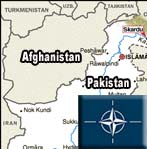NATO considers Afghan request for help in fight against drugs
 Budapest - NATO defence ministers were Thursday locked in tricky discussions over how best to help the Afghan authorities crack down on the country's illegal drugs industry, whose proceeds are in part used by the Taliban to finance the insurgency.
Budapest - NATO defence ministers were Thursday locked in tricky discussions over how best to help the Afghan authorities crack down on the country's illegal drugs industry, whose proceeds are in part used by the Taliban to finance the insurgency.
Speaking ahead of a two-day meeting in Budapest, Afghan Defence Minister Abdel Rahim Wardak said he would ask the alliance "to support our efforts in the counter-narcotics campaign."
Most of the 40 countries that contribute to NATO's International Security Assistance Force (ISAF) in Afghanistan are ready to help Supreme Allied Commander General John Craddock, who wants to use NATO soldiers and weapons to bust heroin laboratories and hunt down drugs lords.
The US is one of Craddock's strongest backers.
"If we have the opportunity to go after drug lords and drug laboratories, this is a legitimate security endeavour," said US Defence Secretary Robert Gates on his arrival in Budapest.
However, Germany, Italy and Spain all argue that such a task would best be left to the Afghan police.
One of their chief concerns is that possible NATO bombing raids on suspect laboratories could kill civilians and thus undermine their painstaking efforts to increase trust among the Afghan population. Sceptics also point out that once a laboratory is destroyed, it is all too easy to set up a new one somewhere else.
Diplomats said ahead of the meeting that one possible solution being discussed in Budapest would be to allow willing countries to join Afghanistan's anti-narcotics campaign on an "opt-in" basis.
According to the United Nations' Office on Drugs and Crime (UNODC), opium cultivation in Afghanistan has fallen to 157,000 hectares, down 19 per cent from last year's record harvest of 193,000 hectares.
The drop has been caused mostly by drought, rather than eradication, the UNODC says.
But UNODC chief Antonio Maria Costa notes that there is "a perfect overlap between zones of high risk and regions of high opium cultivation.
"Since drugs are funding insurgency, and insurgency enables drug cultivation, insurgency and narcotics must be fought together", Costa said in his August report.
Costa urged the Afghan authorities to shift their focus and resources from eradication to closing opium markets, destroying heroin labs, and going after the drug convoys.
More than 90 per cent of the heroin circulating in Europe comes from Afghanistan.
And NATO estimates that 60 per cent of the proceeds from Afghan's heroin industry go to the Taliban, who use the money to buy weapons.
The number of opium-free provinces has increased from 13 to 18 this year, with cultivation highest where the insurgency is strongest. (dpa)